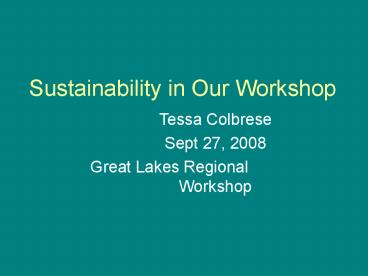Sustainability in the Workshop PowerPoint PPT Presentation
1 / 16
Title: Sustainability in the Workshop
1
Sustainability in Our Workshop
Tessa Colbrese Sept 27, 2008 Great Lakes Regional
Workshop
2
Engineers Without Borders - USA (EWB-USA) is
a non-profit humanitarian organization
established to partner with developing
communities worldwide in order to improve their
quality of life. This partnership involves the
implementation of sustainable engineering
projects, while involving and training
internationally responsible engineers and
engineering students.
3
4
Environmental Impact of Meat
- A 2006 UN commission concluded that
- the livestock sector emerges as one of the top
two or three most significant contributors to the
most serious environmental problems, at every
scale from local to global.
5
Efficiency
- Food Chain!
- It takes 10 times the amount of grain to get the
same amount of calories from beef than to get
those calories from the grain itself - Cattle mass building efficiency 10
6
World Hunger
- Cornell Professor David Pimentel has claimed
- "If all the grain currently fed to livestock in
the United States were consumed directly by
people, the number of people who could be fed
would be nearly 800 million,"
7
Pollution
- World Greenhouse gas emissions
- Animal Agriculture - 18
- Transportation - 13.5
- Reducing meat consumption by 20
- Is equal to
- Switching from a standard Sedan to Prius
8
Pollution Continued - Factory Farms
- Animals kept in crowded conditions
- Need added chemicals to keep them healthy
- Animal waste leaks into ground water, rivers,
streams.
9
Water Pollution
According to the Environmental Protection
Agency Agriculture in the United States much
of which now serves the demand for meat
contributes to nearly three-quarters of all
water-quality problems in the nations rivers and
streams
10
Protecting Resources
Live stock is land and water intensive.
Deforestation common in developing countries to
accommodate a growing demand. Brazil - 1,250
square miles of rainforest in 5 months
11
Biodegradable Utensils, Cups, Plates!
- Bagasse, the natural cellouse fibers that remain
after sugarcane has been processed to remove all
the liquid "juice" from the sugarcane stalk. - Biopolymers that are similar to hydrocarbon-based
thermoplastics, but are made from plants instead
of oil. - They break down in a composter or landfill.
12
Food in Bulk
- Serve-yourself food for 20
- 1 package for 20 people
- Box Lunches
- 1-5 plastic packages per person.
- Wasteful
13
Local Vendors
- Strawberry Fields Catering
- Basil Thai
- Red Herring
- Each less than a mile away.
- Less pollution due to transportation.
- Money towards independent producers.
- Money kept in the local community.
14
Recycled Notebooks
- Environotes notebooks!
- Take notes!
- Write down contact information and ideas!
15
CDM Carbon Emissionshttp//www.sustainabletraveli
nternational.org
- Sustainable Travel International Carbon Footprint
Calculator - Contributions support project like
- Reforestation in China
- Electricity, Power, and Heat from Biomass in
India - Hydraulic Power in Indonesia
- Wind Energy in Madagascar
- Electricity from Sewage in South Africa
16
Thank You!
- Sources
- http//www.nytimes.com/2008/01/27/weekinreview/27b
ittman.html - http//www.sustainabletravelinternational.org/docu
ments/carboncalculator_about.html - http//news.bbc.co.uk/2/hi/science/nature/7600005.
stm

